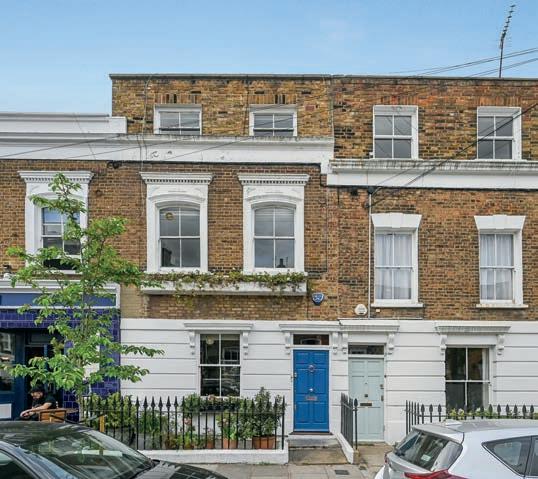
3 minute read
MARKET The whisper
Do London’s off-market sales truly exist? And how can a buyer compete for these elusive properties? Zoe Dare Hall speaks to agents in the know
Two thirds of property sales in prime central London in the last two years have been to cash buyers, according to Savills, and a similar proportion acquired for clients last year were “not openly available”, says one prime London buying agent of the rising number of o -market sales.

“Online portals are now seen by some vendors as over-exposure. Once a property’s out there, everyone knows the colour of your kitchen and the digital footprint can’t be removed,” explains Peter Wetherell, chairman of Wetherell estate agency, who sees half of his agency’s “best instructions” sold o -market or, as it’s also known, on the “whisper market”.
Further clouding the picture, many agents have left big estate agencies since the pandemic and set up as independent brokers and buying agents. It can all add to the sense of the unknown for buyers. How can they be sure they’re seeing the full range of properties available? And faced with such competition, how do they prove they’re the best?
Before Stuart Bailey, head of prime London sales at Knight Frank, explains what the kind of buyer you need to be right now, he wants to explode what he calls “the biggest myth” in prime central London. “O -market sales don’t exist! Either a property is for sale or it isn’t.” Technically, logically, it’s hard to argue. “The idea of being o -market panders to some people’s egos. It gives vendors a sense of discretion and buyers think they’re getting something special,” says Bailey. But there are shades of grey.
“Quite often, when a property is going to be sold, there’s a period of exclusivity before marketing starts, where you open the doors slightly to an existing database of known buyers. That could be called o -market,” Bailey adds of the two-stage marketing process for some properties.
Portals
But buyers – whether they’re waving cash or otherwise – shouldn’t be put o by a sense that there’s an entire o -market tranche unavailable to them. Nor that the emergence of numerous new one-man bands means they’re prevented by any one agent from seeing the full gamut of what’s available. “Buyers like to find an agent who’s savvy, switched on and whom they can stick with. They don’t want to go through the routine with every agent they speak to. But the fee-sharing system that exists between agents and buying agents means you can access everything through your present agent,” says Bailey. The key weapon for buyers, he says, is to only make an o er once armed with as much information about
Of Sales In Prime Central London In The Last 2 Years Were To Cash Buyers
themselves, the vendor and the property, as possible. “Ask the agent about the seller’s situation and their motivation,” he advises. “When you present your o er, outline your situation and state your conditions. Spoonfeed the agent so that they can present your o er in the most credible way and preempt vendor queries.”
If you’re a cash buyer, have the evidence ready. Don’t wait to be asked. One buyer, Bailey adds, went a step further. “They put the deposit in their lawyer’s account before they’d made an o er. Thatshowed they were serious.” Cash is king, but it’s not everything. “If you’re purchasing with a mortgage, having your funds available and being able to demonstrate that you can move quickly will give you equal opportunity,” says Liza-Jane Kelly, head of Savills London Residential.
As for o -market sales, “There’s a misconception that they’re only available to a uent buyers, but that’s not strictly true,” says Kelly. “Access to o -market stock is about the relationship between vendors and agents. Once an agent knows a client’s requirements, they’ll put those properties in front of them.”
The increasing role of social media in prime property marketing will also erode the mystique that surrounds o -market sales, thinks Shereen Akhtar, JLL’s director of Marylebone and Mayfair. “I believe the popularity of o -market property will level out. Sellers will want to showcase their homes on social media to ensure they reach all audiences,” she says.
If the rise in o -market listings and lonewolf agents makes the market seem more opaque to buyers, Paul Cosgrove, director at
Finlay Brewer, advises that building a good relationship with one or more agents will help them navigate the obstacles. “For all of our instructions, o market or on, we talk to those most relevant on our database, but we also have very motivated buyers who stay in touch with us as they want to be the first to hear when something becomes available,” he says.
Using a buying agent also puts buyers in a strong position. “They work on their reputation of knowledge and success. They’re an important in the industry,” says Wetherell.
Yet Bailey argues that an established, respected agent’s website will always trump a portal or unknown agent’s listings as the buyer’s first port of call. “Buyers, buying agents and especially international buyers will know your name. We get our best enquiries through our Knight Frank website,” he says.
The key message for buyers is that o -radar properties and agents don’t equal o -limits. The prime London market is a shifting landscape – you needthe right person and strategies to navigate your way through. L










